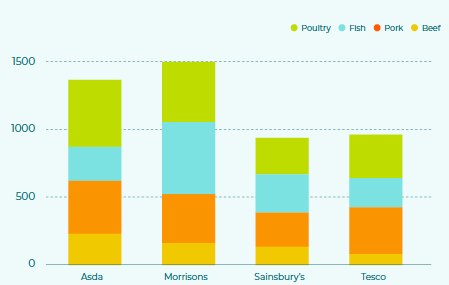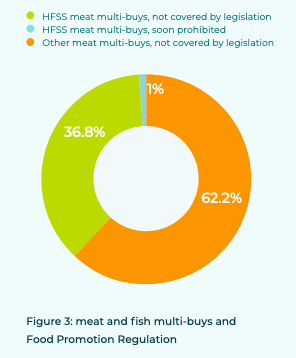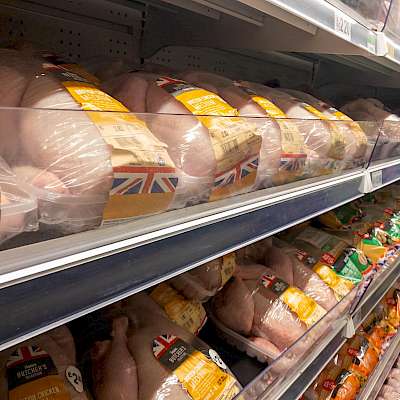A new study shows retailers are failing on climate commitments by encouraging customers to buy more meat, which is bad for our health and the planet.
A study looked at how the Big Four - Tesco, Sainsbury’s, Asda and Morrisons - are using multi-buys, or price reduction, to sell more meat, despite pledges to promote sustainable eating to improve diets and tackle climate change.
Over a five week period from August to September 2021, research foundation Questionmark tracked and analysed promotions for meat products on retailers’ websites. During this period each supermarket’s online store was visited weekly.
The research found that Morrisons (1490) and Asda (1352) ran considerably more promotions for meat or fish than Tesco (948) and Sainsbury’s (933) (Fig 1).

Fig 1: meat and fish promotions for each of the four supermarkets, divided by animal type
Asda and Morrisons use multi-buys most often to promote meat, while Sainsbury’s uses price reduction (Fig 2). The analysis also found that under new food laws coming into effect in October to end the promotion of HFSS (high fat, sugar and salt) products as part of the Childhood Obesity Plan, retailers will still be able to promote meat, as it’s largely exempt from the legislation: only 1% of the meat multi-buys examined in this study would be banned. (Fig 3)

Fig 2: Share of multi-buys in total meat and fish promotions

Fig 3: Meat and fish multi-buys and HFSS Food Promotion law
Simon Billing, executive director at Eating Better said:
“This is further evidence that supermarkets are putting profit before population health and that of the planet, by bombarding us with BOGOF burgers, sausages and cheap chicken of unknown origin. And that’s despite Tesco and Sainsbury’s, in particular, having climate commitments to promote sustainable eating.”
"With food prices soaring and families struggling, we need to make it easier for everyone to eat healthier and more sustainably with less of all meat and more veg. The National Food Strategy said we need a 30% drop in meat eating over the next ten years, acknowledging it won’t be easy to achieve. The Questionmark research shows that supermarkets are making it even harder for us to eat less meat.”
“Supermarkets need to come to terms, and quite quickly, with selling less meat and instead, promote more veg and healthy plant proteins, which are better for us, our pocket and the planet. We urge the government to get behind this and extend legislation, expected later in the year, to ban all meat promotions.”
Although recent findings show that meat consumption is declining slowly In the UK, we still eat more meat than we need, with consumption at nearly twice the global average, negatively impacting our health and the environment. Livestock farming is the biggest emitter, contributing 14.5% of greenhouse gas emissions globally, with around a quarter coming from food production as a whole.
Delivering on corporate climate commitments means retailers will need to sell less meat. A number of UK retailers have pledged to play their part in helping customers eat more sustainably. However, the research shows the Big Four are contradicting their own commitments by encouraging customers to buy more meat than they would have, if it hadn’t been on promotion.
Charlotte Linnebank, Director at Questionmark Foundation said:
“Supermarkets must take the lead in supporting a healthier and more sustainable food environment, to help customers make better choices. That means stepping up and shifting their strategies and actions in line with their climate commitments.
“Our survey also highlights a worrying lack of transparency, which makes it even harder for shoppers to identify ‘better’ meat from farms with higher animal welfare and environmental standards. Consumers need to be confident, if they choose to eat meat, that it’s not costing the earth.”
The National Food Strategy, published last year, recommended a 30% cut in meat consumption over the next decade. It also outlined the need for an integrated approach to address the health and environmental problems caused by the way we produce and consume food. The government’s response - a Food White Paper - is now overdue. Eating Better and over hundred other organisations, academia and food business recently released a joint statement, calling for new primary legislation on food system transformation.
Click here to read the report in full and coverage in The Guardian here and Verve Times here.
